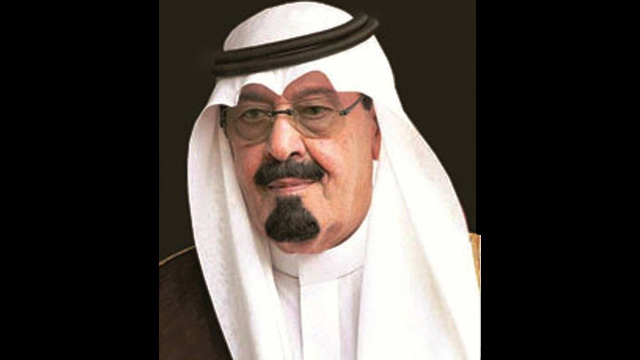Saudi Arabia’s King Abdullah, the powerful U.S. ally who fought against al-Qaida and sought to modernize the ultraconservative Muslim kingdom, including by nudging open greater opportunities for women, has died. He was 90.
Abdullah’s death was announced on Saudi state TV by a presenter who said the king died at 1 a.m. on Friday. His successor was announced as 79-year-old half-brother, Prince Salman, a Royal Court statement carried on the Saudi Press Agency said.
Salman was Abdullah’s crown prince and had recently taken on some of the ailing king’s responsibilities. The 69 year-old Prince Muqrin, a former head of intelligence in Saudi Arabia and half-brother to both Salman and Abdullah, was announced as the kingdom’s crown prince.
More than his guarded predecessors, Abdullah — who ascended to the throne in 2005 — assertively threw his oil-rich nation’s weight behind trying to shape the Middle East. His priority was to counter the influence of rival, mainly Shiite Iran wherever it tried to make advances. He and fellow Sunni Arab monarchs also staunchly opposed the Middle East’s wave of pro-democracy uprisings, seeing them as a threat to stability and their own rule.
Regionally, perhaps Abdullah’s biggest priority was to confront Iran, the Shiite powerhouse across the Gulf. He backed Sunni Muslim factions against Tehran’s allies in several countries, where colliding ambitions stoked proxy conflicts around the region that enflamed Sunni-Shiite hatreds — most horrifically in Syria’s civil war, where the two countries backed opposing sides. Those conflicts in turn hiked Sunni militancy that returned to threaten Saudi Arabia.
Abdullah was selected as crown prince in 1982 on the day his half-brother Fahd ascended to the throne. He became de facto ruler in 1995 when a stroke incapacitated Fahd. Abdullah was believed to have long rankled at the closeness of the alliance with the United States, and as regent he pressed Washington to withdraw the troops it had deployed in the kingdom since the 1990 Iraqi invasion of Kuwait. The U.S. finally did so in 2003.

Abdullah was born in Riyadh in 1924, one of the dozens of sons of Saudi Arabia’s founder, King Abdul-Aziz Al Saud. Like all Abdul-Aziz’s sons, Abdullah had only rudimentary education. His strict upbringing was exemplified by three days he spent in prison as a young man as punishment by his father for failing to give his seat to a visitor, a violation of Bedouin hospitality.
His aim at home was to modernize the kingdom to face the future. One of the world’s largest oil exporters, Saudi Arabia is fabulously wealthy, but there are deep disparities in wealth and a burgeoning youth population in need of jobs, housing and education. More than half the current population of 20 million is under the age of 25. He was a strong supporter of education, building universities at home and increasing scholarships abroad for Saudi students.
Abdullah for the first time gave women seats on the Shura Council, an unelected body that advises the king and government. He promised women would be able to vote and run in 2015 elections for municipal councils, the only elections held in the country. He appointed the first female deputy minister in 2009. Two Saudi female athletes competed in the Olympics for the first time in 2012, and a small handful of women were granted licenses to work as lawyers during his rule.
CCTV’s Nathan King has this report on the Prince who is in line to be Saudi Arabia’s next king.

Crown Prince Salman is one of the last surviving sons of the late King Abdulaziz, the founder of Saudi Arabia. While speculation swirls regarding his health, there are also questions about the future economic and regional stability of the kingdom he will lead.
Salman recently delivered a national assembly speech on behalf of the then ailing King Abdullah. The crown prince talked about plummeting oil prices as well as regional conflicts in Iraq and Yemen.
“The country is facing an unprecedented regional challenge as a result of crisis taking place in neighboring countries which have driven them into civil war and sectarian strife. This requires us to be cautious and careful. I assure you that our leadership is aware of the challenges and implications and that the state will continue to enjoy peace and stability,” Salman said.
Named defense minister and a member of the National Security Council in 2011, he’s considered to have a diplomatic nature and has solved disputes within the Royal family. Relations with Shia Muslims in Iran will be closely watched as will signs of reconciliation with neighboring Gulf states like Qatar, considered a diplomatic rival.
But Salman must also deal with a more pressing crisis. The price of oil has fallen sharply since mid-2014 and OPEC members are pushing the Kingdom to cut production to help stem the decline. The world is watching what the new king will do.
In addition to naming Salman to the throne, the Royal family has already picked Salman’s successor. In an unprecedented step last year, Prince Muqrin, another son of Saudi Arabia’s founder, and former head of the intelligence services, was named the next heir. At 69, he is 10 years younger and was appointed deputy crown prince just in case Salman died before the King.
CCTV America’s Elaine Reyes talked with Patricia DeGenarro from The World Policy Institute for analysis about the death of Saudi King Abdullah. CCTV’s Adel El-Mahrouky commented from Cairo.

The Saudi royal family wants to reassure the world with its road map to succession that it intends to maintain stability in a state that’s not much older than its new leader.
Saudi Arabia has created an allegiance council that will help select future heirs. That has opened the possibility of grandsons of the founder being chosen and therefore much younger leaders for the kingdom.
Tweets with “Prince Salman”
Story compiled with information from The Associated Press.
 CGTN America
CGTN America
